When Religion Makes the News
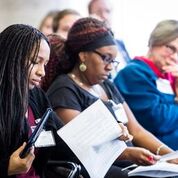
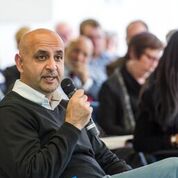
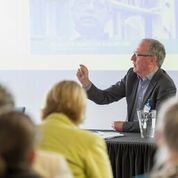
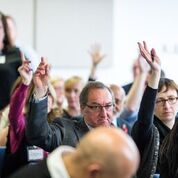
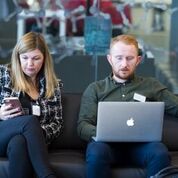
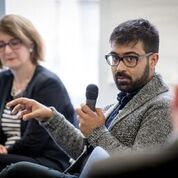
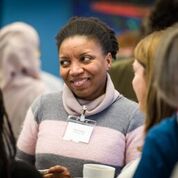
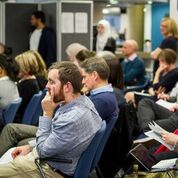 Images copyright of: Natasha Hirst @HirstPhotos
Images copyright of: Natasha Hirst @HirstPhotos
Whether it’s understanding the difference between Sunni and Shia, the background to claims of anti-Semitism in UK politics, or the popularity of “hate” preachers in the US and how they contributed to the rise of Donald Trump, religion plays a key role in many of the biggest news stories of our times. And so it goes without saying that modern journalists need to be religiously literate and aware.
On November 8th, Sandford St Martin trustee Roger Bolton chaired an NUJ Training/ITV Wales workshop for journalists: ‘When Religion Makes the News‘. This was a workshop and networking event for journalists and media representatives from various faith groups and the aim was to promote religious literacy by offering participants expertise, resources and the opportunity both to examine their own personal standpoints while honing their professional skills.
Among those attending the event were three very up-and-coming journalists who worked behind the scenes to support the 2016 Sandford Awards ceremony at Lambeth Palace. We asked them to both report on what happened and to share their thoughts on the conference’s theme. This is what they said:
Nana-Adwoa Mbeutcha: Producer and Presenter for Premier Christian Communications
“Religion is the single most important factor in our identity.” These were the bold words of Dr Jenny Taylor, CEO of Lapido Media, Centre for Religious Literacy in Journalism. Whether you believe that to be true or not, you can’t argue with the fact that religion ultimately determines why people think and behave the way they do, even subconsciously. Broadcaster Roger Bolton, who chaired the event, made the clear statement that you can’t understand the UK without knowledge of Christianity in this country.
Prior to attending ‘When Religion Makes the News’, organised by NUJ Training Wales, I knew that it made sense to know a bit about the religion you were broadcasting about, but as the day went on, I quickly realised how ignorant and naive I was to not realise that to report accurately, “we need a much more sophisticated understanding of faith” (Roger Bolton).
As the day progressed, both journalists and faith representatives heard from Media Representatives from three Abrahamic faiths and we were educated about Muslim life and communities in the UK by Innes Bowen, author of ‘Medina in Birmingham, Najaf in Brent: Inside British Islam’, and Hussein Kesvani, Head of Communications at Theos Think Tank. Who knew there were so many different branches of Islam present in the UK…? Such a simple, yet important, piece of unknown knowledge to many.
What was very enlightening was the “opportunity for self-scrutiny” that was given to the Journalists and Media Academics in an afternoon workshop. Regardless of religious beliefs, we all have a somewhat innate bias and a belief that can shape the way we report or perhaps what we even choose to report. “The Catholic Church is always so out of touch with reality…It’s not rocket science that condoms will stop the spread of AIDS in Africa” some may say. But research the communities a little deeper and remove your bias against the “out-of-date Catholic Church”, and you’ll realise that due to cultural practices and many other factors, not just the absence of condoms, AIDS is being spread. Not only do journalists show a lack of research when they fail to report accurately, we do injustice to those we are reporting to.
To round off the day, we heard from Aaqil Ahmed, Head of BBC Religion and Ethics, and Dr Michael Munnick, Centre for the Study of Islam in the UK. Dr Munnick covered areas such as Political Correctness, Religion in a Secular Society and Understanding what Motivates Religious People.
The event was such an eye opening experience about something that should be such a given. If you’re going to report accurately about a football team, its players and the way they are playing, you need to have real background knowledge about the history of the team and their players, to do a good and honest job. So why don’t we do the same when it comes to reporting about people and society? After all, you cannot separate belief from society.
Ekene Oboko, Researcher / Assistant Producer, CTVC
Along with politics and money, religion has been deemed an unseemly conversation topic at the dinner table. Within journalism, however, money and politics seem to be welcomed enthusiastically at different sort of tables. These tables are the newsroom desks staffed with dedicated political and economic news editors. Despite the inestimable value billions around the world place on their beliefs, and the role religion plays in shaping domestic and foreign affairs – constructive or otherwise – religion is treated, at times, like a distraction from the ‘real’ stories and is therefore downplayed or side-lined – denied a seat at the news desk. This is not to say that news or current affairs does not – to cite a former political press officer – “do God”. They do. The BBC’s commitment to religious programming testifies to that. But religion specialists argue that all journalists, where necessary, should have a deeper understanding of the role religion plays in global and domestic affairs, and also in individuals’ personal lives.
On Tuesday 8th November 2016, the National Union of Journalists in Wales and ITV Wales took on the challenge to promote religious understanding among journalists. The media organisations hosted “When Religion Makes the News” – a one day event held in Cardiff bringing together journalists, representatives from faith communities and broadcast researchers, like my myself, to promote religious literacy.
Roger Bolton chaired the event and in his opening commented that religion was often viewed as an “embarrassment” in society. He suggested that maybe this modern-day puzzlement over religion and those who hold religious beliefs had filtered into news reports, with some mainstream media stories bordering on ignorance when tackling religious issues. Following Roger’s thought-provoking remarks were a series of sessions jam-packed with engaging and informative advice, including a Q & A with the former BBC Head of Religion and Ethics, Aaqil Ahmed. The day also featured valuable networking breaks.
Highlights of the day included a session delivered by Dr Jenny Taylor, previously CEO of religious literacy organisation Lapido Media. She stressed that when journalists engage with stories of a religious nature, they need to be on guard to avoid feeding into the “dominant discourse” and perpetuating religious stereotypes. It’s imperative, she said, for news stories to reflect religion with all its “complexities”.
Press officers from Christian and Jewish faith groups revealed the challenges they have faced when attempting to engage journalists in stories related to their respective communities with reporters appearing to show interest only when the story might impact negatively on the faiths’ adherents. However, Maggie Doherty spoke on the positive media coverage she’d received for The Catholic church in England and Wales’ “The Art of Dying Well” campaign, a digital revamp of the fifteenth century manuscript, Ars Moriendi.
Attendees were treated to a fascinating talk by Innes Bowen, Current Affairs Editor for BBC Radio 4 and the World Service, on the Muslim communities residing in Wales. Former Buzzfeed journalist Hussein Kesvani, now communications consultant at religious think-tank Theos, delivered a detailed and fantastic talk on his experience covering religious affairs, particularly within Muslim communities. He urged journalists to look beyond reporting clichéd stories on Islam, not in aid of some kind of re-balancing exercise, but because they’d find powerful stories within Muslim communities.
The last session of the day was led by Dr Michael Munnik, a former religious correspondent on Canada’s public radio. His talk was targeted at journalists hoping to, or, currently covering religious affairs. For faith communities to trust and support news stories on religion, he said, journalists need to gain the trust of faith communities and “become a safe pair of hands”.
Not being a reporter myself, the most revealing contributions derived from journalists who were not religious correspondents. What came across loud and clear was their willingness to fully engage with the religious dimensions of their stories – unfortunately practical factors, such as deadlines and limited resources, sometimes mean it’s a challenge to explore those stories’ religious elements extensively. Rather than denying religion a seat at the table, it seems journalists, despite wanting to, don’t always even have the time to look for a chair.
You can find out more about When Religion Makes the News by reading blogs from organisers Angela Graham and Anna Wynn Roberts.
And our thanks to Natasha Hirst @HirstPhotos who took the photographs of the event attached to this blog. You can find out more about her work here.


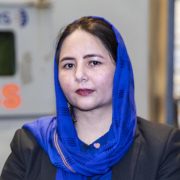


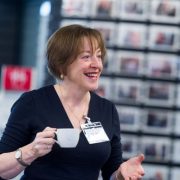

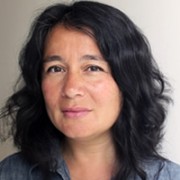
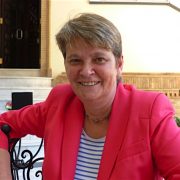
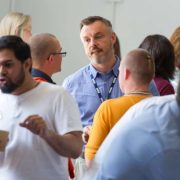


Great blog Ekene and Nage! Thanks for attending the conference and for sharing your experience with us.